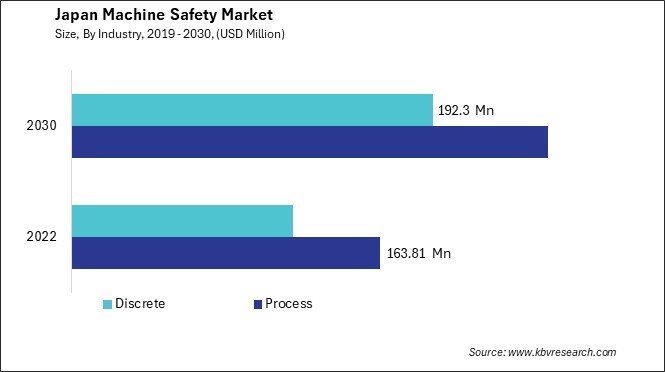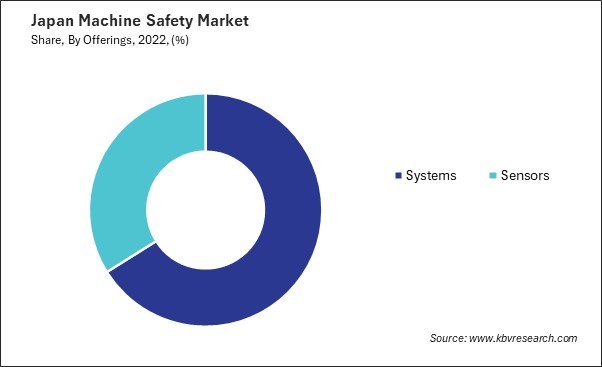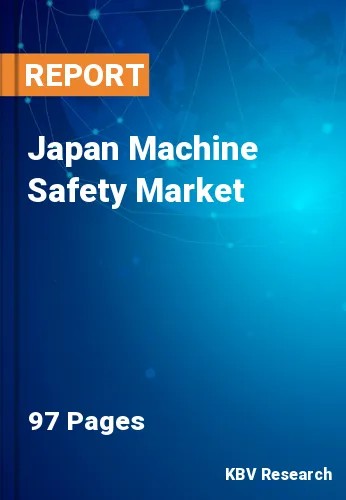The Japan Machine Safety Market size is expected to reach $445.20 Million by 2030, rising at a market growth of 6% CAGR during the forecast period.
The machine safety market in Japan has witnessed significant growth in recent years, driven by the country's emphasis on industrial safety standards and the adoption of advanced technologies in manufacturing. With a strong focus on precision engineering and automation, Japanese industries have increasingly recognized the importance of ensuring machinery and equipment safety to protect workers and assets. Japanese manufacturers have shown a growing interest in integrating Industry 4.0 technologies to enhance operational efficiency and safety.

In Japan, stringent regulations and standards set by organizations such as the Ministry of Health, Labour and Welfare (MHLW) and the Japan Industrial Safety and Health Association (JISHA) have propelled the demand for cutting-edge machine safety solutions. This has led to a surge in the deployment of safety sensors, programmable safety controllers, and other safety devices across various industries, including automotive, electronics, and robotics.
The COVID-19 pandemic has further underscored the need for robust safety measures in industrial settings in Japan. The outbreak prompted a heightened awareness of health and safety protocols, leading many companies to reevaluate and upgrade their existing machine safety systems. The pandemic-driven disruptions in supply chains and workforce availability have also emphasized the importance of resilient and adaptive safety solutions in the face of unforeseen challenges.
The construction sector in Japan has been witnessing a significant expansion, driven by various factors. Within this burgeoning construction landscape, the emphasis on machine safety has emerged as a critical concern, reflecting a proactive approach towards ensuring worker welfare and operational efficiency. The regulatory landscape in Japan has contributed to the expansion of the machine safety market within the construction sector. Stringent safety standards and regulations imposed by authorities have compelled companies in Japan to invest in state-of-the-art safety solutions to comply with statutory requirements and avoid penalties.
One of the primary drivers fueling the expansion of the construction sector in Japan is the government's aggressive infrastructure development initiatives. According to the U.S. Geological Survey, in 2019, Japan's nominal gross domestic product (GDP) reached $5.13 trillion, with the construction sector contributing 5.4% of the overall GDP. Projects such as the construction of roads, bridges, railways, and other critical infrastructure components have surged, creating a robust demand for heavy machinery and equipment. As the scale and complexity of these projects increase, so do the risks associated with machine-related accidents and injuries, prompting stakeholders to prioritize safety measures.
Furthermore, technological advancements have also played a pivotal role in driving the adoption of machine safety solutions in the Japanese construction sector. Innovations such as proximity sensors, machine guarding systems, safety interlocks, and real-time monitoring devices have revolutionized safety protocols, enabling proactive hazard detection and risk mitigation. Furthermore, the integration of artificial intelligence (AI) and Internet of Things (IoT) technologies has empowered construction companies to deploy predictive maintenance strategies, preempting potential equipment failures and ensuring uninterrupted operations. Thus, the construction sector in Japan is experiencing substantial growth, with an increasing emphasis on machine safety driven by stringent regulations, government infrastructure projects, and technological advancements.
The machine safety market in Japan has witnessed a notable surge in demand for safety interlock switches, reflecting a growing emphasis on workplace safety and compliance with stringent regulations. Japanese industries, known for their precision and innovation, have embraced automation to enhance efficiency and productivity. However, this rapid industrialization has also heightened the need for stringent safety measures to protect workers and prevent accidents. Safety interlock switches play a pivotal role in this regard, acting as crucial components in machine safety systems by ensuring that equipment stops when unsafe conditions are detected.
One key factor contributing to the rising demand is the stringent regulatory landscape in Japan. The government has implemented and enforced stringent safety standards across industries, compelling businesses to adopt cutting-edge safety solutions. Furthermore, Japanese businesses are increasingly aware of the long-term benefits of investing in comprehensive safety solutions. With an increasing focus on employee well-being and a proactive approach to accident prevention, companies in Japan are prioritizing the incorporation of safety interlock switches to mitigate risks and enhance overall workplace safety.
The cultural emphasis on precision and quality in Japanese manufacturing aligns seamlessly with the reliability and accuracy offered by modern safety interlock switches. This synergy has further accelerated the adoption of these devices in various industries, ranging from automotive manufacturing to electronics production. Therefore, the surge in demand for safety interlock switches in Japan is driven by stringent regulatory requirements, a growing awareness of long-term safety benefits, and the cultural alignment of precision and quality in manufacturing.

In Japan, the machine safety market has witnessed significant growth, driven by the country's commitment to ensuring workplace safety and compliance with stringent regulations. One prominent player in the Japanese machine safety market is Omron Corporation. Omron is a multinational company that specializes in automation and sensing technologies. In machine safety, Omron provides advanced safety components and integrated solutions to prevent accidents and ensure the well-being of workers. Their products include safety sensors, programmable safety controllers, and safety switches catering to diverse industrial applications.
Another key contributor to the machine safety landscape in Japan is Keyence Corporation. Known for its cutting-edge automation and inspection technologies, Keyence offers a comprehensive suite of safety products. This includes safety light curtains, safety laser scanners, and safety controllers. These solutions are designed to address specific safety challenges across manufacturing, automotive, and electronics industries.
In the realm of safety automation, Sick AG has established a strong presence in Japan. Sick AG specializes in sensor technology and sensor solutions for industrial applications. The company offers a range of safety sensors and systems, including safety light curtains, safety laser scanners, and safety controllers. These products are integral to creating safe and efficient work environments in factories and production facilities.
Japan's machine safety market also benefits from the contributions of Mitsubishi Electric Corporation. Mitsubishi Electric is a diversified manufacturer focusing on providing automation and industrial solutions. In machine safety, the company delivers safety programmable logic controllers (PLCs) and safety relays, contributing to the overall safety infrastructure in manufacturing plants.
Fujikura Ltd., a leading Japanese company in electrical equipment and industrial products, is actively involved in the machine safety sector. Fujikura manufactures safety-related products such as safety mats and edges, essential for creating protective barriers around machinery. Thus, Japan's machine safety market is characterized by diverse companies offering innovative solutions to enhance workplace safety.
By Industry
By Offerings
By Components
Our team of dedicated experts can provide you with attractive expansion opportunities for your business.

